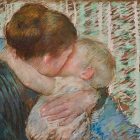The Other Wes Moore’s Exploration of a Life’s Trajectory

In 2010, Wes Moore published his memoir, The Other Wes Moore: One Name, Two Fates, a unique take on the genre that recounts his unlikely history with a man who shares his name. As boys, the two Wes Moores grew up blocks away from each other in Baltimore, and both experienced family strife, brushes with drugs and violence, and run-ins with police. By adulthood, however, the Wes Moores’s paths diverged sharply. The author grew up to be a Rhodes Scholar and White House Fellow while the “other” Wes Moore was convicted of murder and is serving a life sentence. The differences between them are so great as to be inexplicable, and the author, wisely, does not focus on questions of what went right or wrong in either life. He instead offers a truthful portrait of his life and the “other” Moore’s, showing, as he does so, the impact that role models and support can have on a person’s path.
One of the first similarities between the two Wes Moores is their father’s absence, although this lack is experienced quite differently by the two boys. At five, the author loses his father to a sudden illness, but he remembers him as “calm, reassuring, hardworking, and sober.” He also recalls advice his father gave him, such as, “‘Main Man, you just can’t hit people, and particularly women. You must defend them, not fight them. Do you understand?’” Despite not having his father for very long, the author remembers these words for the rest of his life; he does not always heed his words, but the advice is there for him. He has a strong and positive image of his father, thinking of him as a person to admire and respect. Years later, he is still “amazed [at] how I could love so deeply, so intensely, someone I barely knew.”
In contrast, the “other” Wes Moore grows up without a father, and that absence is complete. He has no positive memories or images to counter it. His father is alive, but Wes is raised by his mother, who had “two alcoholic, abusive men who shared the DNA of her two children but no husband or dad for her boys.” When Wes finally does meet his father by chance at his grandmother’s house, he finds, “a man . . . on the couch leaning precariously to the side, his right elbow supporting his body and his head nearly flat against his shoulder. The strong smell of whiskey wafted from his clothes and his pores.” This is essentially the only memory this Wes has from his “nonexistent relationship with his father,” and it is a far different impression from the one the author has. Both fathers are gone, but the legacy they leave behind is vastly different.
In their youth, the Wes Moores have something of a propensity for getting in trouble. By eleven, the author has moved to the Bronx and is attending a private school, but despite these new surroundings and opportunities, he acts out with “bad grades, absence from classes, and an incident with a smoke bomb.” At one point, he is even arrested for spraying graffiti on a lounge wall. When his mother finds out about these transgressions, she scrapes together enough money and sends the author to military school at Valley Forge. The author is initially stunned and miserable, but he is also struck by some of his classmates. The author “noticed a man I had not seen before but whose presence dominated the room, demanding not only focus but respect . . . In spite of myself, I was impressed. He was black, stood about five ten, and carried a muscular 210 pounds.” At military school, the author has an opportunity to see a black man in a position of power and respect and knowing such people eventually shifts his perspectives on how he wants to live his life. He writes, “with the support of people like Cadet Captain Hill . . . I’d actually started to enjoy military school. They made it clear that they cared if I succeeded, and eventually so did I.”
The “other” Wes Moore is also a rule-breaker, and his indiscretions are surprisingly similar to the author’s at the same age. As he gets older, though, he becomes more involved in selling drugs, and also becomes a father at a young age. But there is no military school for him, and he is left mostly left to fend for himself. The main guiding voice for the “other” Wes is his older brother, Tony, who “tried to keep Wes in school and away from drugs for as long as Wes could remember. But Tony was still deep in the game himself,” and it is difficult for Wes to take Tony’s advice seriously. In addition, Wes looks up to his older brother and wants to be like him, “but the more he tried to be like his brother, the more his brother rejected him.” Wes is left with contradictory images about how to live his life, and no clear path forward. He has to make a living and support a family, and he does so through the means available to him.
Military school may have allowed the author to gain a sense of his future, but it also gives him more chances to realize it. The author decides to stay at Valley Forge and obtain an associate’s degree, and his college advisor suggests he attend Johns Hopkins afterward. For the author, it would be a Baltimore homecoming, although he feels that “Hopkins was also full of kids who did not look or sound like me.” The author doubts his ability to matriculate, but he is aided by “Paul White, the assistant director of admissions at Johns Hopkins . . . a black man with a warm disposition and a booming voice” who Wes feels “had gotten to know me and understood my story on a personal level.” The author eventually receives acceptance and a scholarship to Hopkins, and he reflects on Paul’s help and how “those who snuck in despite coming from the margins—the mission has to be to pull up others behind us. That’s what Paul White did for me, and it changed my life.” Wes does not find success by himself, and he understands “the way privilege and preference work in the world, and how many kids . . . didn’t have ‘luck’ like mine.”
One of those kids, arguably, is the “other” Wes Moore. Having progressed to running a small drug operation, Wes finds himself tired of the risks and grind of his lifestyle and attempts to change paths by enrolling in “Job Corps, a program . . . designed to help disadvantaged youth.” It is an opportunity to obtain “a general equivalency diploma (GED) and the skills to help him land a job . . . the pay would be lower than what he was making on the streets, but the work was steady and honest.” In Job Corps, Wes elects to train as a carpenter and finds some teachers who support him; he “stayed at the Job Corps Center so he could provide a better life for his kids.” Job Corps offers the support Wes needs and has all the makings of a new life, but a year after graduating, “Wes realized the only consistency in his employment was inconsistency. That, and the fact that none of these jobs paid over nine dollars an hour.” Wes’s experience highlights how one instance of support is not enough to alter a life: it must be continuous. With two children to support at this point and feeling as if he has no other options, Wes returns to selling drugs.
While at Hopkins, the author studies abroad in South Africa. It’s there that he receives a phone call from his mother during which she tells him, “the cops are looking for another guy from your neighborhood with your name for killing a cop.” The author admits that the story of the “other” Wes Moore stayed with him. Even two years later, he “was still thinking about the story. I couldn’t let it go. If you’d asked me why, I couldn’t have told you exactly.” He eventually writes to the “other” Wes, and the two begin a correspondence that develops into the author’s memoir.
The author writes this book out of an attempt to understand their two lives. He stresses that he does not want to “provide excuses for the events of the fateful day . . . the only victims that day were Sergeant Bruce Prothero and his family,” but the “other” Wes has experienced loss as well, that day and long before. The author knows this, and he writes their stories in part out of his belief in “the decisive power of information and stories—the kind provided and modeled by friends, family, mentors, or even books . . . to change people’s lives.” The Other Wes Moore offers no easy answers—there are none—but it does show how the author experienced sustained support in a way that the “other” Wes did not.


